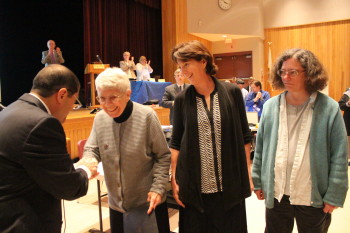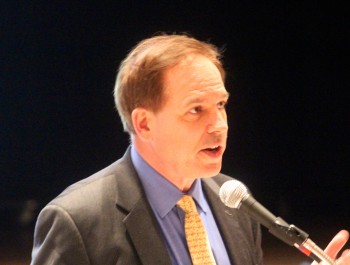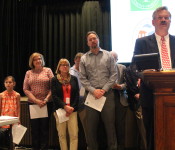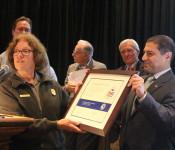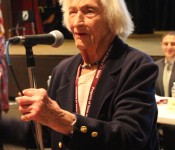Photo: Moderator Mike Widmer.
7 p.m.: Welcome to hopefully the final night of Belmont’s annual Town Meeting. Tonight, capital budget appropriations will be highlighted as will a reconsideration of the solar power article which was indefinitely delayed in May.
7:11 p.m.: And the meeting starts with a shout out by Moderator Mike Widmer on all those who make Town Meeting “works.”
7:12 p.m.: Glenn Clancy, director of the Community Development office, gives an update on the Trapelo/Belmont corridor project. Interesting points: some sidewalks are showing defects and changes have been made. The project from Mill Street to Cushing Square is just about done except for the final top coating. It is a positive message that Belmont is moving forward on the town’s roads.
7:21 p.m.: Up now is Article 18, which reauthorizes the eight revolving funds, all self funding. There are two new accounts: Stormwater consulting and storm water improvements. The money comes from fees so the funding is not coming from general funds. It’s adopted unanimously.
7:25 p.m.: Now up is an overview of the capital budget appropriation process from the Capital Budget Chair Anne Marie Mahoney. Interesting facts:
- The initial request from all town departments came to $5.4 million.
- The amount of money of potential unfunded requests was $1.2 million.
- But there was even more money coming to Capital Budget including from the override and one-time funding.
- That leaves $1.8 million for capital projects.
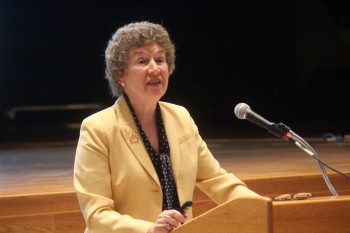
In public safety, the priorities start with the high school fire alarm system. It must be replaced now – during the summer of 2016 – and it has to be replaced because the current one is nearly 45 years old. Cost, $1.2 million. Other priorities are fire alarms at the Butler and Town Hall and the replacement of portable radios. The replacement is part of a greater program in which a large amount will be bonded.
Mahoney then goes over the other expenditures, a total of 23.
A pair of large borrowing is one the way. The fire alarm at the high school will result in borrowing $1.55 million with a five year bond in 2016 or $236,000 per year, coming out of the capital budget each year.
The radio system will require a ten-year bond for $1.09 million.
Roads and sidewalks: all the money in fiscal 16 will come to $2.55 million from several sources. “This is an all time high,” she said.
Mahoney notes that the major capital projects are
- The DPW building ($28 million)
- New Belmont High ($70 million)
- A new police station ($20 million)
- a new library ($18 million with state and private funds)
All are expensive and also needed.
Guess what, there will be needs for additional space at nearly all the schools by 2017. Capital budget will be part of the process.
Mahoney is given a big hand by the gathering for a great report.
7:54 p.m.: There will be four motions in the Capital Budget expenditure, the first, Section A, is the reading of the 23 items that are being purchased or leased at $1.8 million. Kevin Cunningham, Pct. 4, asks the process for estimating $1.4 million for the high school alarm replacement with a new high school being planned. Mahoney said even if funding for the new school is approved by the state in December, it will take years before construction on a new school begins. Cunningham asked if the new floor can be salvageable in a new school. Of course, said Mahoney.
Julilet Jenkins, Pct. 3, asked why the system is now being replaced if it was known that it was outdated for years. Mahoney said the hope had been that a new school would be coming but the alarm system simply needs to be done.
Christine Doyle, Pct. 1, asked if it wouldn’t be wise to bond now as rates are currently so low. Treasurer Floyd Carman said rates will be just as low in 2016 as now. “Great, I’ll sign up for your newsletter,” Doyle quipped.
Rachel Berger, Pct. 2, asked if the fire system will last until 2016, or “will be homeschooling 1,100 students.” Fire Chief David Frizzell said the system is on its last legs and his department will work with the limitations before him.
Answering a question on whether to build a new or renovated high school, Mahoney said the shell of the building is in perfect shape, “built to last forever” so there is no need for a new building like other communities were required to do. But the systems are so old and there is need for a new science space.
Donald Mercier, Pct 8, said he “didn’t want to disappoint” the gathering by not asking a question, asking town officials on the price tag on a new rec vehicle and the shed at the library for the snowblower. Cunningham said while he talks process, he thanks the committee for making an expenditure for traffic calming at Lexington and Sycamore. The $1.8 million budget is adopted unanimously.
Section B appropriates $1.09 million for the purchase of radio transmission equipment for fire and police use and portable radios. Bonnie Friedman, Pct. 3, asks if this expenditure is needed if the town joins a regional 911 system. David Kale, Town Administrator, said the equipment is needed by the town. The section is approved with only six no votes.
Section C, is the fire alarm replacement project costing $1.06 million in bonding. No questions from members and the vote is 221 to 9.
Section D, is the $1.55 million in road paving. Janet Kruse, Pct. 3, asked if the money coming in this year can be used this year. Yes, said Clancy, and if not used this year, it would go into next year. Monte Allen, Pct. 8, asks what is the level of scrutiny that the Warrant and Capital Budget committees use to make the decisions. When these budgets come to Town Meeting, they are a fait accompli. Mahoney, Selectman Chair Sami Baghdady and Michael Libenson defend the process as open and complete.
Here’s some news, from a question for Catherine Bowen, Pct. 4, Baghdady said the town could be revisiting the percentage spent on sidewalk repairs. The current policy, which limits sidewalk expenditures since there was such a need to use the limited funding capacity on roads, will be reviewed according to Baghdady.
The motion is adopted unanimously.
8:47 p.m.: Article 15 is to accept $800,000 in state money for to resurface and repair our roads. Sounds good to the gathering. Passes.
Before the break, Widmer praises the “huge, huge contribution” of the volunteers on the capital budget and warrant committees who perform the usually unseen but greatly important work to bring the the budget to Town Meeting.
9:06 p.m.: After the break, Article 11, approve the enterprise funds for water and swear and storm water services. Pretty straight forward. Approved.
9:09 p.m.: Article 19, which establishes a new capital/debt stabilization fund for the capital costs on four building projects: the high school, the police station, the public works building and the library. It will be funded by the sale of the Woodfall Road parcel, the municipal parking lot in Cushing Square and other accounts. This will allow one-time funds to be placed in reserve to take one step closer to finishing these projects while not increasing the tax burden. “We need to tackle the big four,” said Mahoney, who said this will spark a debate among residents on the four projects. There is an amendment waiting.
Kevin Cunningham, Pct 4, wants to read an apology, which is rather personal discussing “his shame” for attempting to use Town Meeting to discuss something other than the amendment he presented, saying he wants to find a way to have a venue to express his opinion on process. He is given a hand.
Don Mercier, Pct 8, asked if the article is defeated, where will the money raised by Woodfall Road sale, etc. It will go into the general fund.
Johanna Swift Hart, Pct 4, wonders if the money from the two sales wouldn’t be better spent going into free cash which was depleted by $1.3 million for the Belmont Center reconstruction. Selectman Mark Paolillo said there is an expectation that there will be money at the end of the year will be going into free cash and these are capital projects “that are not running away” so let’s address them, said Baghdady. But Swift Hart said free cash isn’t free so “where is my money.”
Paul Roberts said the capital projects will take years to take hold, asking if there is any policy on funding years in the future.
Julie Crockett, Pct 5, asked Baghdady isn’t it true that any funds could to be placed into the fund will have to wait until next year’s Town Meeting. True, said Baghdady. Can’t we wait until next year to set up the fund? she asked. Yes, was the response. Crockett asked if the town shouldn’t wait until next year because there could be needs – such as housing all the new students coming into the schools – that could be more pressing.
This requires a 2/3s vote: This should be interesting. And the vote is 192 to 30. That was not even close.
9:35 p.m.: Article 20: The Minuteman Regional Voc High Regional Agreement is being postponed. Jack Weis, Pct. 1, who is Belmont’s rep on the Minuteman School Committee, said this is the same article presented to Town Meeting last year. Attempting to explain the background of this article is a terribly tangled web in an attempt to build a new school (which many people feel is too large) in Lexington with 15 partner communities. It’s suffice it to say that since one town of the 16 voted it down, why take it up. The measure is approved.
10 p.m.: Now is the reconsideration of Article 9, the solar power article. Selectman Jim Williams said he would not be moving forward on the reconsideration so that ends the action.
William continues to say that he is dismissing three of four citizen petitions as the selectmen and
